- Home
- Claire North
The Thief Page 2
The Thief Read online
Page 2
Into this city as the clocks struck noon tumbles Remy Burke, hungover, bewildered, a bag upon his back containing one pair of pants, two pairs of socks, a box of matches, a stub of candle, two hundred baht in various pieces, a pencil and a knife. In any city in the world, such a man might cause some remark, and now such remarks were death or as near to death as ever he could imagine.
Had he bet his memories?
Such bets were not unheard of in the Gameshouse, and he had no reason to doubt Silver’s word. Should the umpires have not intervened? Should someone not have stopped him? (Games are not always fair.)
Too late to wonder now.
He runs.
Chapter 6
Only three ways out of Bangkok. Train, boat or road. Each has their disadvantage.
Alternative?
Stay in Bangkok.
Hide out in an embassy with foreigners like himself?
But no. Too obvious: the embassy would become a trap, a prison; he’d be found, he had no doubt, Abhik catching him within a few days, a week at most. He needed to get into the country, find a forest or a mountain, keep moving.
No time to stop and think it through. Dammit! No time.
Train, boat or road?
He was less than a mile from the central station, and from there to anywhere, the growing tendrils of Siam’s railways spreading out before him, but it was obvious, easy, the trains infrequent and unreliable. There existed no real timetable, only a blackboard with departures scrawled up by a grinning man in a crooked cap, a promise of good intentions rather than a guarantee of escape.
Or perhaps he’d get lucky. Perhaps there’d be a train.
Road?
Cars are still rare, the property of the very rich; better to steal a bicycle.
A six-foot-two Frenchman on a bicycle peddling through the fields of Thailand might still excite some remark; but that’s a problem he’ll have wherever he goes, whatever he does.
Oh, he has been played, has Remy Burke! He has been played long before this game began.
He makes a decision, the middle way, and runs for the river.
Hey hey! Let us stand a moment together you and I on the banks of the Chao Phraya and listen to the calls, hey hey! You want something, sir, you want to buy? Here, I have gold, silver, gems, totems of sacred power; I have herbs, spices, rice wrapped in banana leaves, locusts deep-fried, very good, very tasty, sparrows on a skewer you can eat whole, prawns bigger than your fist, hey hey! Slow down, sir, slow down, it’s very good, you’re foreign, yes, you’re rich, yes, you’ve come to the East to taste something wonderful: try this, buy this, buy her, buy him; come sir, come! The floating market is always here, a hundred little rafts and boats, a dozen great steamers, a handful of clippers that wormed their way up from the bay to the south: we are here, all of us, waiting for you, as you have waited for us, gold flowing along the Chao Phraya river.
Remy does not buy.
He has fifty baht in his bag and the clothes he wears. Every satang now counts; every grubby coin and haggled bargain. He runs, breathless and sweaty, the air a humid cloak that smothers the skin, faces turning in amazement at this gasping stranger, for who runs in Thailand? Keep a cool heart, tut the old men in the doorways. Be happy and keep your heart cool.
In other times he loved this country for its immersion in relaxation. The sun is too hot, the people seem to say, the ground too wet, the mountains too high, the rice too green for stress, so be calm, wind down, the train will leave when the train feels like it, the tide will turn when the river is ready so why do you pant and stamp your foot?
He stamps his foot because he will die, his mind will die, if you do not get out of his way!
The waterside. The river has not yet been fully tamed; it still carries memories of those good old days when the city floated on top of it, and only the Grand Palace stood in its way. In Ratanakosin, the kings of this land built stone walls to protect their homes, their vaults, their stolen emerald Buddhas, but away from those fine places of gilt and gold, wooden wharves, sticking out into the water like dead leopard tongues, are man’s greatest incursion against waves. The sea is to the south, but there is too much danger of hitting international waters, of breaking the rules, and if Remy fears one thing more than defeat, he fears the umpires, white-robed and unrelenting, who find their prey in any place. Now the gnats buzz over the edge of the water, the flies cling to the empty sockets of the dead fish laid out for sale, the easy-time girls coo at the foreign buyers and sellers come to port, at the neat Japanese who sniff and tut and head to a more important meeting with more important men; at the wandering Chinese, thrown by war and politics from their own country to seek new meaning in new places; at the Malay labourers looking for a taste of freedom; and the Anglo-Indian scholars who have lived long enough to wonder what “freedom” even means. They come, they all come, to the market, and so does Remy, praying that in this crowd even he, ridiculous-looking he, will not stand out.
“Nakhon Sawan! I am going towards Nakhon Sawan!” He addresses the boatsmen in Thai, but they laugh at his flushed face, panting breath.
“Take the train, Frenchman!” advises one, casually throwing barrels of silver fish over the side. “You’ll like the train!”
“I want to go by boat.”
“Why? It’ll take much longer, you look in a hurry.”
“I like the river.”
“Take the train, French! It’s much better for you!”
So rejected, he looked at his watch.
Twenty past twelve.
What would he do if he was Abhik Lee?
He would raid the hotel, hoping to catch Remy with his pants down, certainly. But he’d also send pieces to the station, set watchers on the roads, set a cordon round Ratanakosin, and of course – but of course – he’d send pieces to the waterfront. Not as many, perhaps, as he’d put on the trains, but still enough that he could be spotted. How long would it take? If he was lucky, Abhik would have sent too few people to apprehend him immediately; or perhaps not? Perhaps Abhik’s hand is that good, every piece he plays a master of muay boran, every one a killer.
He looked along the shore and saw no one obvious, no one staring at him too hard, too long, but then again on this waterside, this teaming waterside of barrels and crates, of bartering and discord, he is the most obvious thing about it. Poor Remy Burke, the most obvious man in Thailand.
(He looks, and does not see, but that does not mean that his enemies are not already there for lo! we spot the woman that his eyes skim over, her hair blue-black, her eyes laughing, seemingly at the antics of a group of children who prod a still-crawling crab with sticks along the quay, but who sold her soul to the Gameshouse when she was just fourteen years old, bartering away her freedom to save her baby’s life, and who now is a piece in someone else’s hand.
She smiles to see the children play, and turns from the waterfront to send a skinny boy on a bicycle to the train station to summon up more men.)
A boatman unloads barrels of still-living snakes. He harvested them from the swamps to the east, great tangled masses of red, black, brown and green that snap at each other as they are hooked on the end of a pole. His four-year-old daughter sits in the front of his barge playing with a tiny one that has taken a particular fancy to the twist of her wrist, before her brother, ten and all grown up, pulls it by its gaping jaw and tosses it with the rest of its kin, condemned to a culinary destination or a medical fate.
On the pier, the wife haggles. Her arms are lightly pocked with a dozen snake bites which she brushes off now as easy as a fly. Her clothes are not so much worn as wrapped all about her, great twists and barrels of cloth in faded blue and brown, spun around her chest, her waist, her head, her feet, and we can feel perhaps a moment of sympathy for the man who is on the receiving end of her tongue, as forked as her cargo, sympathetic as a fang.
“No!” she proclaims. “No, no! You pay the price we agreed or we go elsewhere!”
“Where will you go?�
� demands the buyer. “Where will you go? This is an inferior cargo!”
“It is not inferior: it is exactly what we agreed; you pay what we agreed…”
As they row, Remy eyes the boat. He kneels down by its prow, smiles at the boy, who glares like a man. “You came down Chao Phraya?” he asks softly.
The boy nods, shoulders back, chest puffed; a little warrior.
“You know Nakhon Sawan?”
“Hey! You want to buy snakes?” The father steps forward, boat bouncing unevenly. “I can sell you snakes, good for you to eat them, good for the heart, good for being a man! My wife handles all the money things.”
“Are you going north?” asks Remy. “Towards Nakhon?”
“Yes, north – but not all the way. The people aren’t so good there.”
“But out of the city?”
“Yes – you want to come?”
“I do.”
The husband runs his tongue around the inside of his lips, looking Remy over. “I’ll talk to my wife,” he says.
“Could we leave immediately?”
“Once we’ve unloaded snakes!”
The wife is there quickly, a tiny woman cowing all before her, glaring up into Remy’s face. “Where do you want to go?” she demands in rata-tat-tat Thai straight from the front lines.
“North. Out of the city.”
“Why?”
“Honestly, ma’am – I made a bet and now I need to get away.”
She sucks in her breath, long and slow, clicks her tongue, looks at her children, her husband, her barrel full of snakes. “Five baht!”
A fortune – a veritable fortune! He can pay it a hundred times over in the normal way of things, but this is not the normal way of things. “Three baht.”
“Five!”
“Three, ma’am. There are many boats which would take me further for three.”
Her eyes wander across the wharves, assessing her potential rivals, hungry for profit. “We aren’t going to Nakhon.”
“But you are leaving the city?”
“Three baht…you are a villain, but three!”
He smiles.
“Let me help you unload.”
Chapter 7
We watch the boat slip away from the land.
We are not the only ones.
Four minutes after it has reached the centre of the stream, knocking against the sneaking currents of the river, three cars arrive. Three are two more than are usually seen in Bangkok, save when the king or the generals go about their business, but there they are, black, American-made, carried over the Pacific by a great white-painted steamer, decks scrubbed and windows clean, which will be sunk in four years’ time by a German U-Boat prowling the shipping lanes for arms and men. We are impressed that Abhik Lee has such good cars ready to do his work, but then we remember – he has been planning this for a long time, hasn’t he? Nothing is chance in the Gameshouse.
Abhik Lee steps onto the quay, shields his eyes against the glare of the high-noon sun, squints against the river. Thinks, perhaps, that he sees the shape of Remy Burke, huddling low but still clear, against the side of the little rocking boat. Seeing is not enough – he must tag his target.
“Get on the water,” he barks to the men from one car, and then to the other, “Get ahead along the river. Don’t lose sight of the boat.”
How close he is! He can win this in a day, perhaps. What a glorious victory that would be.
Two hours later, a police boat pulls alongside the little barge of empty barrels and shed snake skins. The officers scream at the family to obey, to stop, where is the foreigner?
The husband clings to his oar; the little boy cries.
The wife stands in the middle of the boat, arms flapping, tongue lashing like rigging in a storm, proclaiming you pigs, you dogs, you come here, you speak to us like this, how dare you, how dare you, look at what you people have become!
Abhik Lee leans forward on the railing of the police boat.
“Ma’am.” His voice is quiet, courteous, unstoppable. “Where is the foreigner?”
The foreigner paid three baht to be taken north, but handed over only two and they hadn’t travelled more than a mile before, without explanation, he demanded to be rowed to the easterly bank of the river, and hopped overboard.
“How long ago was this?” sighs Abhik Lee.
“About an hour! He didn’t even say thank you!”
Abhik Lee’s face contorts briefly in a scowl, which vanishes as quickly as it blooms. He at least is courteous, always so very courteous. Lose courtesy, and you lose control; lose control and you lose yourself.
Shall we peek?
Oh, go on then.
Let’s look at the cards in Abhik’s hand.
We ease open his jacket pocket, slip our fingers down towards the silver cigarette case where he so discreetly stashed them, slide it out while he is otherwise occupied and flick through the papers.
My – my, oh my! What a hand was here dealt!
Police inspectors, spies domestic and foreign, a communist saboteur, chiefs of little villages where surely the Gameshouse should not have reached (and yet how far it goes), two abbots and a nun, an anarchist rumoured to have planted a Malaysian bomb or two, a criminal overlord and his son, two majors, three industrialists, one colonel and a general! With cards like these, you could stage a coup, topple a king, start a war! These are extraordinary cards you have been dealt, Abhik Lee, and for what?
To hunt a single man, alone and hungover, through the rivers of Thailand?
We slip the cards back into Abhik’s pocket, our presence unknown, our thoughts unexpressed. We are the watchers that take no part, the umpires that judge all but can never be judged. We play the players.
Run, Remy Burke. Run.
Chapter 8
For seven hours, they hunt high, they hunt low.
Abhik Lee plays three cards fast. A policeman stops all trains leaving the central station, saying a murderer is here, searches every compartment of every truck. The passengers sit around on their suitcases and bundles, chins in their hands, waiting until at last, five hours after the first train to the north should have gone, Abhik says, “Enough,” and the policemen lets them go, pumping great black clouds from the stacks of the engine and creaking slow over the too-quickly rusted tracks as they head away from the city.
A colonel sets up roadblocks on the main roads from the city. There was a threat against the king, he explains, a foreigner with a gun, and now everyone must be stopped and checked. The French ambassador and his mistress were heading out into the countryside for a few days of light hand-holding and poetry-making (as some might put it) and, since they are foreign and heading away, they are stopped and held at gunpoint while the colonel examines their papers, their faces, their lives. The French ambassador threatens gunboats and retribution, not so much in indignation at his condition, but in terror of his wife finding out, when word trickles back to the embassy, of just who he was with when so slandered.
The colonel examines the ambassador and says, “No – it’s not him,” and lets him go.
On the river, the police boat chugs up and down. Its highest speed is eight knots, but on the Chao Phraya that is something almost extraordinary, and the boatmen tut and shake their heads as the police churn by, exclaiming, “In such a hurry! These busy people and their crimes, so stressful, so much stress!”
By the time the sun is down and the mosquitoes are out, Abhik Lee is very quiet and very calm.
“It’s fine,” he says. “A quick capture would have been ideal, but we are prepared for the long game. Let him run; let him hide. We’ll have him within the week.”
This said, he goes directly to the telegraph office and begins to raise his forces through the rest of the country.
Chapter 9
Darkness settles.
We settle with it.
So still, so quiet. We – you and I – we are so used to the bright lights of the city, to the sky flecked with the refle
ction of our business, but here, in this time and in this place, all is darkness, all is quiet. The roads of Siam are peopled by day with trudging barefoot men and baby-swaddled mothers; with skipping children, ear-flicking donkeys, ponies and their traps and even, if you head far enough from the city, the occasional slow-marching elephant and his rider, hauling great logs of timber or pallets of clay to their destinations. There are cars, surely, and trucks too, but they are few and far between, and we may stand now, you and I, and turn our faces towards the stars and see an infinity of light that shines in the heavens, but not, we think, upon the earth. Dao Look Kai, the seven little chickens that threw themselves into the fire where their mother burnt, a tiny cluster of starlight that we might call the Pleiades. The crocodile, Dao Ja Ra Kae, look on him and remember always to do good deeds so you will be rewarded. Dao Jone, the brightest star of all. Children born under his light will become robbers, and the dogs that would have guarded the house all fall asleep under his silver gaze.
Stop.
Listen.
A van approaches! Most rare sight, a Russian-built thing, perhaps? No – not Russian. A British van come up from India, a tarpaulin upon its back, crates bouncing with the light rattle of green celadon pottery, delicate cups and narrow-lipped vases which are gently going out of fashion as the spread of the West to the East begins to overwhelm the once fashionable spread of the East to the West.

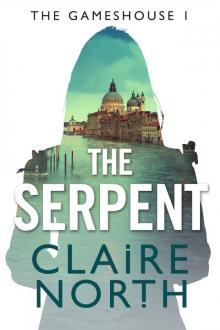 Gamehouse 01 - The Serpent
Gamehouse 01 - The Serpent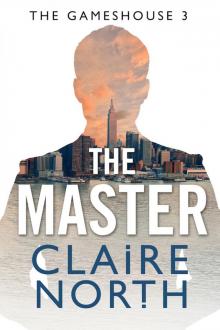 The Master
The Master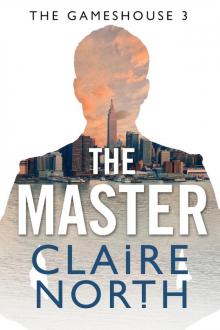 Gamehouse 03 - The Master
Gamehouse 03 - The Master The Thief
The Thief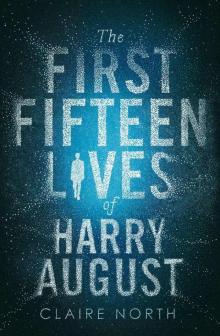 The First Fifteen Lives of Harry August
The First Fifteen Lives of Harry August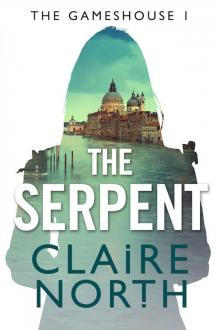 The Serpent
The Serpent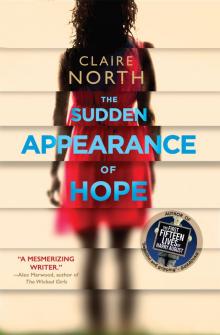 The Sudden Appearance of Hope
The Sudden Appearance of Hope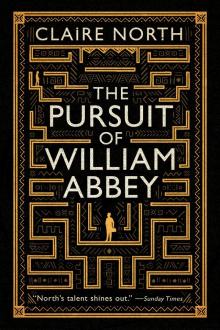 The Pursuit of William Abbey
The Pursuit of William Abbey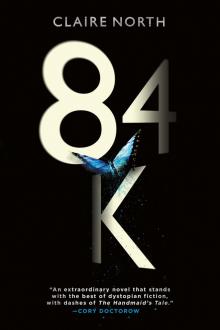 84k
84k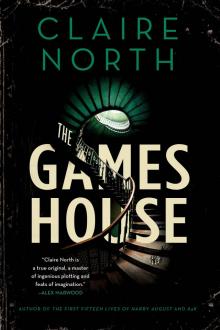 The Gameshouse
The Gameshouse Touch
Touch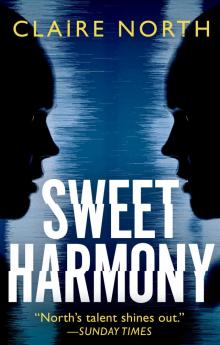 Sweet Harmony
Sweet Harmony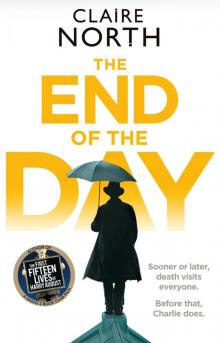 The End of the Day
The End of the Day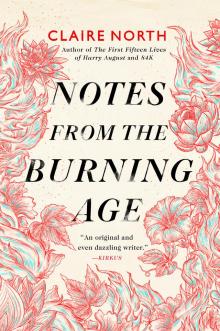 Notes from the Burning Age
Notes from the Burning Age